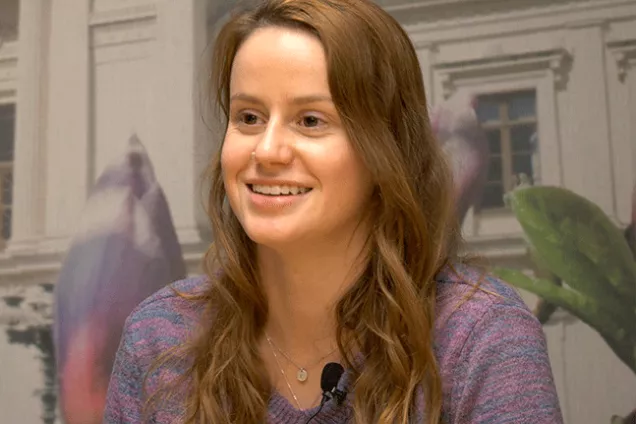Biology, Conservation Biology - Master Programme
Master's programme · 2 years · 120 credits

Description
Are you passionate about saving nature and combating the loss of species? There is a growing need for experts on nature conservation and biodiversity. Our Master’s programme gives you solid biological expertise, enabling you to work with both entire ecosystems and the survival of individual species.
This Master’s programme provides you with both global and regional perspectives on problems related to reduced biodiversity. You will learn about issues in conservation biology related to why certain species are threatened and how they can be saved from extinction, as well as gain understanding for how ecosystem functions and ecosystem services are related to biodiversity. You will learn how to use modern population ecology and genetics, in addition to various analytical methods within conservation biology. You will obtain concrete tools for managing and recreating natural ecosystems and for mapping the loss of species variety.
Excursions and field projects are included in many of the courses. Field instruction is an important part of the programme and is provided at no cost to the student. Elective courses allow you to specialise in tracheophytes, mosses, larvae, fungi, birds or insects (some of these courses are given in Swedish. The programme also provides you with specialised knowledge on experimental design and statistics, as well as training in analysing and interpreting biological data. You will practice both oral and written presentations and obtain ample experience in working in groups. Teaching takes place on modern premises and in laboratories with advanced equipment.
The Master’s programme has a high proportion of scheduled lessons, and the interaction with teaching staff and course assistants is relaxed. The programme has strong ties with research. All of the teaching staff are researchers, and as a result the courses are continuously adapted based on current research. The Department of Biology has several world-leading research teams and conducts both basic research and applied research in, for example, conservation biology and ecosystem services. The language of instruction is English, apart from individual elective courses on species knowledge.
Programme structure
The programme has a recommended study route, but you can also make a personal study plan after consultation with the study advisor and programme coordinator. You will initially take a course on population and community ecology, which also includes statistics and experimental design. Thereafter you can select courses on modelling and advanced statistics or animal ecology, for example. During the spring semester you will attend a compulsory course on specialised theory and modelling within nature conservation and conservation biology. You will also study more applied aspects of nature conservation during a course on either biological monitoring or water management.
During the programme you can also take courses on geographic information systems (GIS) or species identification, for example. The degree project is worth 30, 45 or 60 credits and is generally conducted in a research team, but it can also be conducted in cooperation with a public authority or a company. The Master’s programme offers the option of doing an internship, which can provide valuable contacts.
Career prospects
After graduation, you can work in nature conservation in both the public and private sectors, for example as a municipal ecologist, at county councils or as a consultant. The knowledge you obtain is also needed in silviculture and agriculture. Among other things, your work duties could include environmental monitoring, taking species inventory, field sample collection, offering advice as well as assessing and implementing biodiversity measures. If you are interested in research within conservation biology, there are good opportunities to continue your studies at a higher education institution.
Computers in the programme
The programme requires that you have access to a computer, preferably a laptop, on which you can install software mainly provided by the University, such as Microsoft 365, CAD/CAM and development environments for Python, Matlab or other computational tools. It can be either a Windows computer or a MacOS. On some courses you may need to buy or rent your own software.
Conditions in the study environment and during study visits and field studies
The programme contains compulsory elements that require you to be able to work independently and safely in a laboratory environment, in a hospital environment, in workshops, in production facilities, or during study visits and field studies. These elements require the ability to comply with safety regulations and instructions, and to move around in and evacuate premises safely. The elements also require the ability to monitor and control the processes studied.
Ethical concerns
The programme includes compulsory elements that some people may have concerns about, such as patient-centred activities in healthcare, animal testing or dissection. However, the student is obliged to acquire knowledge and skills in these areas as well, to the extent necessary to fulfil the learning outcomes of the course. For some elements, there might be specific requirements regarding rules on hygiene, the design of protective and work clothing, confidentiality and professionalism.
Programme sheets
Open for applications
Application opportunitiesThis programme is open for applications from 16 October to 15 January.
Contact
Department of Biology, Study advisor
Lotta Persmark
Phone: +46 46 222 37 28
Email: lotta [dot] persmark [at] biol [dot] lu [dot] se
Requirements and selection
Entry requirements
Specialisations: Conservation Biology
Bachelor’s degree of at least 180 credits, of which 90 credits must be in science, including 5 credits in statistics and 60 credits in biology comprising cell biology, genetics, microbiology, ecology, botany and zoology, or the equivalent.
English course 6 (advanced proficiency)
Selection criteria
English language requirements
Most of Lund University’s programmes require English Level 6 (unless otherwise stated under 'Entry requirements'). This is the equivalent of an overall IELTS score of 6.5 or a TOEFL score of 90. There are several ways to prove your English language proficiency – check which proof is accepted at the University Admissions in Sweden website. All students must prove they meet English language requirements by the document deadline, in order to be considered for admission.
How to prove your English proficiency – universityadmissions.se
Country-specific requirements
Check if there are any country-specific eligibility rules for you to study Bachelor's or Master's studies in Sweden:
Country-specific requirements for Bachelor's studies – universityadmissions.se
Country-specific requirements for Master's studies – universityadmissions.se
Apply
Start Autumn Semester 2026
Day-time Lund, full time 100%
In English
Study period
31 August 2026 - 4 June 2028
Application
Last application date 2026-01-15
How to apply
Lund University uses a national application system run by University Admissions in Sweden. It is only possible to apply during the application periods.
Step 1: Apply online
- Check that you meet the entry requirements of the programme or course you are interested in (refer to the section above on this webpage).
- Start your application – go to the University Admissions in Sweden website where you create an account and select programmes/courses during the application period.
Visit the University Admissions in Sweden website - Rank your programme/course choices in order of preference and submit them before the application deadline.
Step 2: Submit documents
- Read about how to document your eligibility and how to submit your documents at the University Admissions in Sweden website. Follow any country-specific document rules for Master's studies or Bachelor's studies
Country-specific requirements for Bachelor's studies – universityadmissions.se
Country-specific requirements for Master's studies – universityadmissions.se
- Get all your documents ready:
- official transcripts and high school diploma (Bachelor's applicants)
- official transcripts and degree certificate or proof that you are in the final year of your Bachelor's (Master's applicants)
- passport/ID (all applicants) and
- proof of English proficiency (all applicants).
- Prepare programme-specific documents if stated in the next paragraph on this webpage.
- Upload or send all required documents to University Admissions before the document deadline.
- Pay the application fee (if applicable – refer to the section below on this webpage) before the document deadline.
* Note that the process is different if you are applying as an exchange student or as a part of a cooperation programme (such as Erasmus+).
* If you have studied your entire Bachelor's programme in Sweden and all of your academic credits are in Ladok, you do not have to submit transcripts or your diploma when applying for a Master's programme. However, there may still be other documents you need to submit! See the link below.
* Svensk student?
Läs instruktionerna om att söka till ett internationellt masterprogram på lu.se
Programme-specific documents
In addition to the documents mentioned under Step 2, you must also submit a 'Summary Sheet' when you apply for this programme.
Summary Sheet for the Master's programmes in Biology (PDF, 80 kB, new tab)
Tuition fees
Non-EU/EEA citizens
Full programme/course tuition fee: SEK 370 000
First payment: SEK 92 500
Citizens of a country outside of the European Union (EU), the European Economic Area (EEA) and Switzerland are required to pay tuition fees. You pay one instalment of the tuition fee in advance of each semester.
Tuition fees, payments and exemptions
EU/EEA citizens and Switzerland
There are no tuition fees for citizens of the European Union (EU), the European Economic Area (EEA) and Switzerland.
Application fee
If you are required to pay tuition fees, you are generally also required to pay an application fee of SEK 900 when you apply at the University Admissions in Sweden website. You pay one application fee regardless of how many programmes or courses you apply to.
- Paying your application fee – universityadmissions.se
- Exemptions from paying the application fee – universityadmissions.se
- Convert currency – xe.com
*Note that there are no tuition or application fees for exchange students or doctoral/PhD students, regardless of their nationality.
Scholarships & funding
Lund University Global Scholarship programme
The Lund University Global Scholarship programme is a merit-based and selective scholarship targeted at top academic students from countries outside the EU/EEA.
Lund University Global Scholarship
Within the framework of the Lund University Global Scholarship programme, the University also offers the African Research Universities Alliance (ARUA) Scholarship targeted at top academic students from selected African research universities.
Swedish Institute Scholarships
The Swedish Institute offers scholarships to international students from certain countries who are applying for select Master's programmes in Sweden.
Scholarship information on the Swedish Institute website
Country-specific scholarships and funding options
Lund University has agreements with scholarship organisations and funding bodies in different countries, which may allow applicants to apply for funding or scholarships in their home countries for their studies at Lund University.
External scholarships
Pioneering Women in STEM Scholarship
The Swedish Institute offers scholarships for Master's studies in Sweden for women from selected countries in Africa and Asia who want to pursue degrees in STEM fields. Check the country and programme requirements on the Swedish Institute's website to see if you are eligible for the scholarship.
Testimonials about this Master's

Meet our student ambassador Lillian
Read her testimonial and chat with her via Unibuddy.

"The best thing is the flexibility of the programme"
Emma from Canada

"The best thing is that the programme is very well structured"
Vidula from India

Studying at The Faculty of Science
Watch Julia's video testimonial on YouTube.